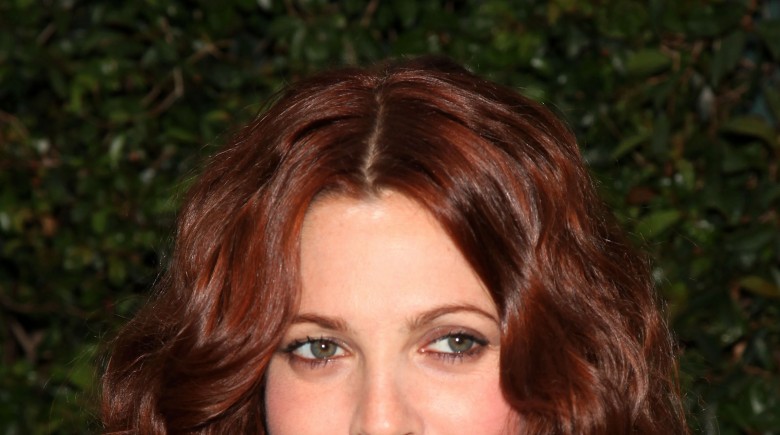When your last name is Barrymore and you come from an acting dynasty (her grandfather was actor John Barrymore and her uncle, Lionel Barrymore, is famous for playing Mr. Potter in It’s A Wonderful Life), it seems almost inevitable that you end up as an actress. Throw in to that mix that your godfather is Oscar-winning director Steven Spielberg and it seems that Drew Barrymore’s path has been predetermined.
She began acting in commercials as an infant and had her first major role at the age of 7 when she starred in Spielberg’s E.T.: The Extraterrestrial. She became the youngest person to ever host Saturday Night Live.
But with that kind of fame and access to anything she wanted at such a young age, she had substance abuse problems as a teenager and ended up in rehab. Unlike most of her colleagues that have the same issues (insert whatever troubled young celebrity name you like here), Barrymore turned her life around by starring in some minor films and then, in 1995, starting her own production company called Flower Films (along with her producing partner, Nancy Juvonen, who was introduced to her husband, Jimmy Fallon, by Barrymore).
Flower Films has become very successful, producing such hits as Charlie’s Angels, Donnie Darko, 50 First Dates and He’s Just Not That Into You. She also became the face of Cover Girl Cosmetics in 2000.
Because Barrymore was home schooled, she became a strong supporter of education, particularly in Kenya, where she had learned that many children had to walk great distances to get to school, only to arrive to overpopulated classrooms. She reached out to the World Food Programme arm of the United Nations and, in 2007, became a WFP Ambassador Against Hunger after several trips to Nairobi and Kenya.
Her efforts were first highlighted by going to Washington D.C. along with other WFP ambassadors and asking the government to commit more money to supporting programs that not only provide meals but provide housing as well to students.
In 2008, she donated $1 million to the WFP and in 2009, she founded the Drew Barrymore Education Foundation. The mission statement of the foundation is to bring clean water and access to schools to several towns in Kenya and to encourage people to believe that education is the key to the way out of poverty.
And,when Drew Barrymore and her husband, Will Kopelman, became parents of daughter Olive in 2012, they made the decision to sell the first baby photos to People Magazine. But neither Barrymore nor Kopelman benefited financially from this arrangement with People. According to sources from the magazine, the couple asked that the money be donated to the Drew Barrymore Education Foundation.
When we’re surrounded by badly-behaving celebrities, it’s refreshing to see someone who turned her life around and has made it her mission to ensure that others get the opportunities that a good education can afford.
When your last name is Barrymore and you come from an acting dynasty (her grandfather was actor John Barrymore and her uncle, Lionel Barrymore, is famous for playing Mr. Potter in It’s A Wonderful Life), it seems almost inevitable that you end up as an actress. Throw in to that mix that your godfather is Oscar-winning director Steven Spielberg and it seems that Drew Barrymore’s path has been predetermined.
She began acting in commercials as an infant and had her first major role at the age of 7 when she starred in Spielberg’s E.T.: The Extraterrestrial. She became the youngest person to ever host Saturday Night Live.
But with that kind of fame and access to anything she wanted at such a young age, she had substance abuse problems as a teenager and ended up in rehab. Unlike most of her colleagues that have the same issues (insert whatever troubled young celebrity name you like here), Barrymore turned her life around by starring in some minor films and then, in 1995, starting her own production company called Flower Films (along with her producing partner, Nancy Juvonen, who was introduced to her husband, Jimmy Fallon, by Barrymore).
Flower Films has become very successful, producing such hits as Charlie’s Angels, Donnie Darko, 50 First Dates and He’s Just Not That Into You. She also became the face of Cover Girl Cosmetics in 2000.
Because Barrymore was home schooled, she became a strong supporter of education, particularly in Kenya, where she had learned that many children had to walk great distances to get to school, only to arrive to overpopulated classrooms. She reached out to the World Food Programme arm of the United Nations and, in 2007, became a WFP Ambassador Against Hunger after several trips to Nairobi and Kenya.
Her efforts were first highlighted by going to Washington D.C. along with other WFP ambassadors and asking the government to commit more money to supporting programs that not only provide meals but provide housing as well to students.
In 2008, she donated $1 million to the WFP and in 2009, she founded the Drew Barrymore Education Foundation. The mission statement of the foundation is to bring clean water and access to schools to several towns in Kenya and to encourage people to believe that education is the key to the way out of poverty.
And,when Drew Barrymore and her husband, Will Kopelman, became parents of daughter Olive in 2012, they made the decision to sell the first baby photos to People Magazine. But neither Barrymore nor Kopelman benefited financially from this arrangement with People. According to sources from the magazine, the couple asked that the money be donated to the Drew Barrymore Education Foundation.
When we’re surrounded by badly-behaving celebrities, it’s refreshing to see someone who turned her life around and has made it her mission to ensure that others get the opportunities that a good education can afford.






